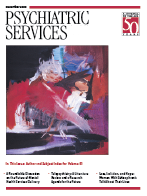Professor Damasio (
1), a distinguished neurologist and author of the highly acclaimed
Descartes' Error, has written an additional masterpiece this time focusing on consciousness. The distinctive characteristics of his style are displayed perhaps even more marvelously here. His prose is fresh, exciting, penetrating, and extraordinarily clear. Damasio's engaging and informal way of sharing with the reader how he has come to learn to untangle intricate links between the mind and brain and his presentation of this information in a narrative that flows smoothly and manages always to illuminate, engage, and excite are hallmarks of his literary style, which is displayed here in surpassing brilliance.
This book does not focus on psychiatric problems per se. However, it covers a central topic for all professionals engaged in the enterprise of assessing, understanding, and healing problems associated with how persons feel, think, and experience their world. It is the neural basis of consciousness that commands the author's attention: how the brain is able to assemble images of the outside world and, in conjunction with this awareness of the existence of objects and happenings in the world, also to "know" that these images and patterns are being viewed by and are happening to, and indeed belong to, the self. Hence his book offers a compendium of the neural basis of selfhood.
In outlining the scope and content of his narrative, Damasio begins by delineating a continuum between, on the one hand, core consciousness and core self, which describe momentary awareness of the world and of a being's participation in it, and on the other hand, an extended consciousness and an autobiographical self that endow human beings with a capacity to place ongoing mental experience in an extended world of memories and knowledge structures that in effect authorize a layered, complex sense of knowing. This division of the cognitive-emotional space of consciousness maps the human evolutionary terrain, from apes to Homo sapiens, and also the clinical terrain created by brain injury and, as a consequence of injury, made available to interested clinicians and observers.
In separate chapters Damasio elaborates on the contributions of various brain and mental functions to the drama and puzzle of human awareness and consciousness. He covers in depth the influence of emotions and feelings, language, perception and image formation, aspects of knowing, and the more complex and subtle problems posed by memory. Throughout these chapters, Damasio places in context the key historical concerns of the neurological and cognitive sciences. He presents and discusses clinical cases and explains themes of overriding importance for understanding behavior. Damasio's analyses manage to capture in a direct, unassuming, and very clear way central enigmas of how brain events and processes shape behavior.
Readers of Psychiatric Services are used to dealing with persons whose problems of behavior and experience usually do not involve neuroanatomy, the physiology and biology of consciousness, anomalies of knowing and of body awareness (such as agnosias and anosognosia), and factors that interfere with the understanding and production of language. Except for the small proportion of patients with general medical and neurological disease and with head injury who happen to develop secondary psychiatric disorders, the status of the brain and the complexities of its many cognitive "organs" can be taken for granted in clinical psychiatric care. Yet because mental health professionals are interested and involved spectators of the sufferings and impairments of others whom they deal with on a daily basis, they are naturally drawn to seek to understand how brain and biology account for the puzzle of behavior. Furthermore, in the current phase of mental health thinking and practice, which is governed by neurobiological and psychopharmacological reductionism, they cannot but conclude that attention to functions of the brain in relation to their clinical work is important.
Almost all staple themes of the neurology of behavior and of the interplay between brain and behavior are addressed in this beautifully written book. The author uses clear prose, lucid diagrams, and an easy-to-grasp presentation of a few cardinal and essential technical terms to describe the intricacies of all facets of human psychology from a neurological standpoint that is accessible to the intelligent and interested general reader.

